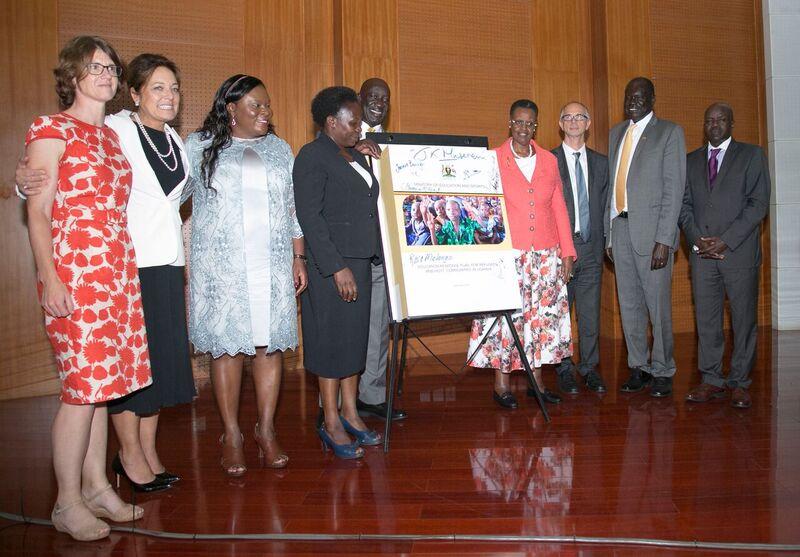Uganda launches new Education Response Plan for Africa’s biggest refugee crisis
The
Government of Uganda, Partners in Development, UN agencies and NGOs have launched
a new Plan that if funded will provide quality education for hundreds of
thousands of refugee and host community children in Uganda.
The
Education Response Plan (ERP) is the first of its kind worldwide and represents
a huge policy step forward for refugee education globally.
It sets out exactly
how to address a crisis where more than half a million children are out of
school. 57% of refugee children in Uganda (at least 353,000) and 34% of local
children in refugee-hosting districts (around 171,000) do not have access to
education[i].
Uganda hosts the largest number of refugees in
Africa, and is one of the top refugee-hosting countries worldwide. The Plan,
which was developed within the framework of the Comprehensive Refugee Response
Framework (CRRF) recently adopted by all nation states, confirms Uganda’s
leading global role.
At country level, the Office of the Prime Minister (OPM)
and the Ministry of Local Government, with UNHCR playing a catalytic role,
coordinates implementation of the Framework[ii].
More refugees continue to
arrive daily, with most fleeing from extreme violence in South Sudan,
Democratic Republic of Congo and other conflict-affected countries. More than
130,000 have arrived this year alone, and at least 61% are children under the
age of 18.
The influx is putting a severe strain on already limited school
resources in local communities. Many classrooms have no walls or electricity
and lacking latrines and basic sanitation facilities that are needed to
accommodate so many children safely and with dignity. There is also a drastic
shortage of teachers and basic materials such as books and desks.
The Hon. Janet K. Museveni, the First Lady of
Uganda and Minister of Education and Sports, said:
“This is a children’s crisis. None of these
children chose to become a refugee, but they have had their lives ripped apart.
Now we must give them the chance of a future.
“Education is hope. It brings a sense of normalcy
to their lives ravaged by war and suffering. It protects them and helps them
cope with their difficult situation, and builds a foundation from which they
can reach their potential. Education is vital if we are to break the
vulnerability created by conflict and displacement.
“We are committed to helping these children, but now
Uganda needs support to make this Plan a reality. Together we can and must
ensure that all children get the opportunity to access inclusive, quality
education at all levels.”
The
ERP has been developed by the Ministry of Education and Sports, with support
from international donors, UN agencies and development organisations in Uganda.
“Enabel welcomes the Education Response Plan,
and has worked together with the Ministry of Education and other partners in
its development, as member of the steering committee. The ERP will give an
opportunity to refugee children to attain education and skills development,
which will empower them and help shape their future and that of their nations
of origin,” said Niels De Block, International Skills Development Expert at
Enabel.
Enabel
is already contributing to the provision of education for refugees and host
communities in Uganda through the Support Programme for Refugee Settlements in
Uganda (SPRS-NU). Funded by the European Union Emergency Trust Fund, through
SPRS-NU Enabel runs programmes that equip youth, women and girls with
employable skills that can enable them get employment or create their own jobs.
This year alone, 1,480 youth are benefiting from the programme.
The
Government of Uganda has been serving as a model example in the international
community by granting refugees asylum and access to the same rights as its
citizens. However, more support is urgently needed from the international
community to ensure the Plan can be implemented.
The
Plan has been developed to align closely with Uganda’s Education Sector
Strategic Plan (ESSP) for 2017-2020. It aims to improve access to and quality
of learning across all forms of education in Uganda’s 12 refugee-hosting
districts, through activities including:
- Constructing
new classrooms and repair existing ones in order to make schools safer and more
accessible – for example - so that children with disabilities can attend;
- Providing
essential materials such as textbooks, desks and stationery;
- Addressing
teacher gaps and capacity to deliver quality education to refugees and host
community learners;
- Strengthening
the national and district level education system for effective and sustainable
service delivery;
- Getting
older youth who had dropped out of school back into education, through
Accelerated Education Programmes and vocational training; and
- Piloting
innovations in education.
[i] Figures for refugees are available for 8 of the 12 refugee hosting
districts.
[ii]The Comprehensive Refugee Response Framework (CRRF) was adopted by
all 193 Member States of the United Nations in September 2016 as part of the
New York Declaration for Refugees and Migrants.
Latest news from this project
No news

